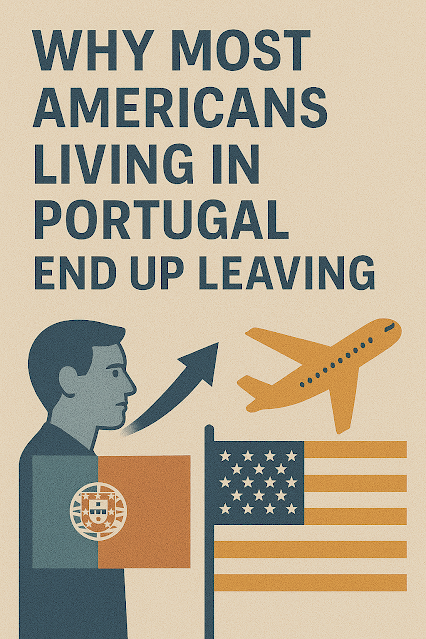Portugal has gained massive popularity among Americans in recent years, thanks to its affordable lifestyle, beautiful landscapes, and high quality of life. However, not all expats stay long-term. While many arrive with high hopes, a growing number of Americans end up leaving Portugal within a few years. In this 2025 guide, we explore the most common reasons behind this trend—and how you can avoid making the same mistakes.
🇺🇸 Unrealistic Expectations
Portugal is often portrayed online as a paradise with low costs, no stress, and perfect weather year-round. While it does offer many advantages, the reality can differ from the Instagram dream. Some Americans arrive expecting a seamless transition and are surprised by the challenges of adapting to a new culture, bureaucracy, and language barriers.
💼 Visa & Bureaucracy Frustrations
Many Americans struggle with Portugal’s slow bureaucracy. Getting a visa (like the D7 or D8), scheduling SEF/AIMA appointments, dealing with tax offices (Finanças), and navigating unclear documentation requirements can feel overwhelming.
- Delays in residence permits
- Inconsistent procedures across cities
- Limited English support at government offices
💶 Cost of Living Isn’t Always “Cheap”
While Portugal is affordable compared to the U.S., prices—especially in Lisbon, Porto, and the Algarve—have risen significantly. Many Americans expect to live comfortably on modest incomes but are shocked by rising rents, private health insurance, and inflated prices in expat-dense areas.
🗣️ Language Barrier
English is spoken in many urban areas, but Portuguese is essential for full integration. Tasks like visiting a doctor, dealing with legal issues, or reading official documents can become obstacles. Many Americans don’t invest in learning the language, which limits their ability to adapt and build connections.
🌐 Isolation & Cultural Differences
Portugal’s culture is slower-paced and more community-oriented. While some embrace this, others feel disconnected or lonely. If you move without a strong support system or community, it’s easy to feel isolated—especially in smaller towns or rural areas.
🏥 Healthcare Expectations
Portugal offers excellent public healthcare, but it’s not always what Americans are used to. There can be long wait times, limited English-speaking doctors in public facilities, and cultural differences in bedside manner. Some Americans prefer private care, which adds extra costs.
💡 Mismatched Lifestyles
Life in Portugal is slower and more relaxed—which can feel frustrating for those used to the fast pace and 24/7 convenience of the U.S. Business hours, customer service, and even online infrastructure may feel outdated by American standards.
📦 Poor Planning or Rushed Moves
Some Americans move impulsively, driven by online hype or the desire to escape U.S. issues. Without enough research or financial planning, reality hits hard. Returning home becomes the only option when savings run out or legal issues arise.
✅ How to Avoid These Mistakes
- Visit Portugal for several months before committing to a full move
- Learn at least basic Portuguese early on
- Choose your location carefully—big cities vs. rural towns
- Budget realistically for rent, insurance, and long-term visas
- Join expat groups and connect with locals to avoid isolation
📍 Final Thoughts
Portugal continues to be an amazing place to live—but only if you come prepared. Unrealistic expectations, lack of integration, and bureaucratic challenges are the main reasons Americans leave. With the right mindset, proper research, and community support, you can make your life in Portugal a lasting success—not just a short-lived dream.

